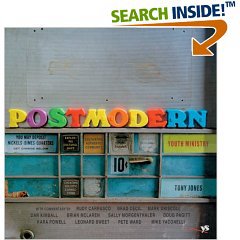"Postmodern" ministry

New book on my favorite book list: Postmodern Youth Ministry. I had to write a brief response to the book for my Adolescent development and family ministry class. The book talks about youth ministry but all the ideas translate over.
Tony Jones approaches Youth Ministry as an ever shaping object. If times are changing then we need to change with them or else our methods for reaching people will be far behind the people we’re trying to reach. Jones approaches several different issues related to youth ministry. Community, evangelism, and the Bible are among the issues addressed in post modern youth ministry.
Jones’ approach to community is as the new “front door” to involvement. Where in the modern day students were drawn in by flashy programs, bright lights and laser shows, those days are gone. Where as once those things were in place to draw kids in now they are simply a teaching tool. Post modern students have a desire for relationship and authenticity. To draw someone in with something they like and then give them Jesus instead is what Jones calls the “bait and switch,” which is far from authentic and will more likely repel students from getting involved than draw them towards it. Their hunger for authenticity is paralleled and related to their desire for relationship. Students want real heart felt relationship that has meaning.
Relationship is the new “front door.” Kids are now drawn by their closest friends and people with whom they share a mutual care for one another. It’s through this kids will be drawn and we as youth pastors must raise our awareness of this. We must create space and structure which caters to this type of community attraction.
In the modern age evangelism was essentially about changing the mind of a person. It was a sort of intellectual algebra, leading someone to an intellectual decision. Jones believes real evangelism is about changing the whole person. As our culture has changed, so must our ideas about evangelism. “Evangelism and apologetics must always be done in culturally appropriate ways.” Where as in the past things were spoken of as true and false, black and white, foundationalistic, they are now being spoken of much differently. Absolutes are being “overthrown” and truth has found a deeper meaning. Christians have continued to speak of their faith has the only absolute truth. Jones suggests that we should address it as “the best option,” the best possible way to live out of a smorgasbord of other ways.
The modern approach is doing more harm than good in our culture. It’s undeniable that the modern approach is ‘saving’ some but the number is small. We live in a culture that’s drenched in spirituality and the church still believes it needs to throw spirituality on billboards. We have become like an industry. Efficiency has become the primary goal in youth ministry. How many can we reach? How fast can we reach them? We replace efficiency with effectiveness. The large numbers in churches are deceiving. How many are really there for the right reason? How many are really being changed and not just informed. Jones argues by implication that we should not believe in efficiency but, rather, effectiveness. Jesus best work was done one on one and in small groups. Take for example the woman at the well, the blind man, the ten lepers, Zaccaeus, the rich young ruler, the list goes on.
We are most effective when we drop efficiency as if we are under some kind of time dilemma and pick up effectiveness both on a corporate level and a personal level. When our conversations are about making conversions instead of offering the best possible way to live, when being saved becomes merely intellectual or emotional we’ve lost our influence and we’ve abandoned what’s at the heart of the gospel.
We’ve also lost what’s at the heart of the scriptures. In Liberal setting the Bible has been watered down by the assumption that kids won’t believe a supernatural Jesus. These ministries abandon Jesus’ miracles and focus on His teachings. In conservative settings fundamentalism has set in. The fundamentalist perspective looks to scripture as a purely factual book. They find meaning within the dogmatic approach. The doctrines have become a brick wall which needs to be defended. If one brick is taken out to be examined then the whole wall falls apart. Therefore you must believe as they believe or you are outside the brick wall completely. Both sides have abandoned the priority of scripture. When we approach the scriptures as a creative book, as “a beautiful compilation of poetry and prose, song and story, diatribe and exhortation” we capture the heart of scripture. It becomes something that comes to life for us. We do the bible injustice when we teach it in ways that have been overused. If we never let our interpretation of scripture remain flexible and expandable then it will always be dry and boring to a generation that’s heard it all.
We must realize that every generation has heard it all, in all facets of ministry. Christianity is something that must be continuously reshaped, reformed. Imagine if Martin Luther never reexamined this whole thing, what if he never reformed? The reformation would never have happened. We must always reform always reshape our faith in context of our culture. We must always reform and that is what the postmodern world is desperate for; creative reformation.